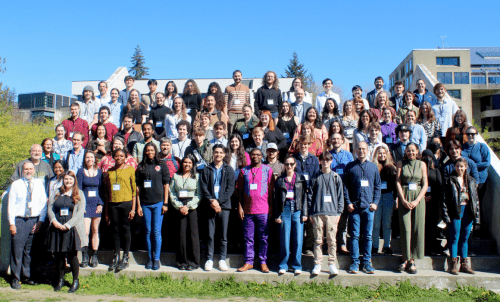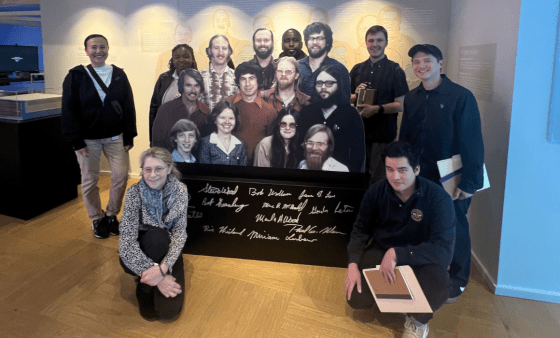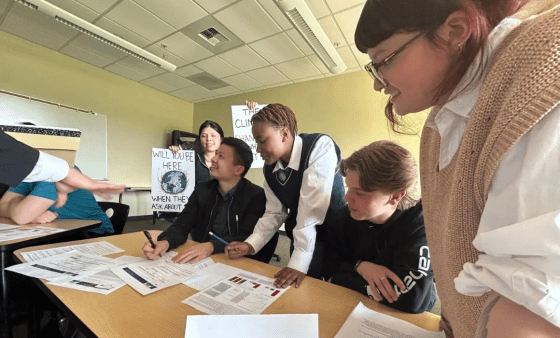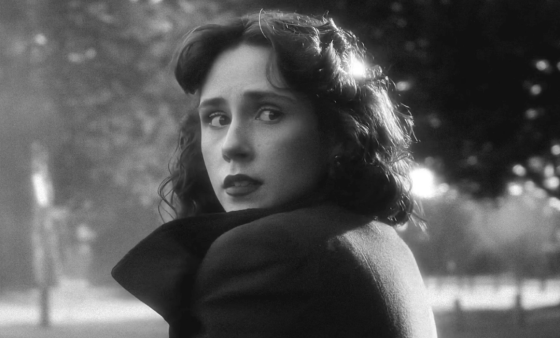CAS students present at American Chemical Society Puget Sound Section Undergraduate Research Symposium

"It was a wonderful experience for our students to see the research of undergraduate students at peer institutions."
- Sailaja Arungundram, Ph.D. & Brandy Fox, Ph.D.
Four Saints got a taste of academia when they represented Saint Martin's at the undergraduate research symposium hosted by the American Chemical Society Puget Sound Section.
With registration covered by ASSMU funds and a generous travel support from the Natural Sciences Chair Dr. Hartman and CAS Dean Dr. Coby, these science students got to attend the first in-person symposium since the pandemic. The annual undergraduate research symposium was an exciting day of exchanging new ideas with peers from other local colleges, featuring 25 poster presentations and five undergraduate oral presentations.
Vanessa Wilmoth '24 and Tamera-Leialoha Viavo '24 won prizes for their presentation "Exploring the Structure and Function of the Plasmodium Falciparum Malate Dehydrogenase Enzyme Using in silico and in vivo Methods: An Undergraduate Biochemistry Lab CURE Project", which shared results from a semester-long original research project conducted in their biochemistry lab course. Known as an MDH CURE project, it involved providing an inclusive research experience for students from a broad background. Their advisor, Sailaja Arungundram, Ph.D., shared that their biochemistry CURE talk was well received by both a student and faculty audience when they spoke about their best learning experiences.
Carla Kumher '25 and Zoey Coleman '25 won awards for their poster presentation on "Synthesis and Characterization of Novel Schiff-Base Ligands and Related Ruthenium Complexes." Zoe and Carla continue to work on the projects that they started in Dr. Brandy Fox’s lab as sophomores.
Since Fall 2023, students in Dr. Sailaja Arungundram’s biochemistry lab course have been involved in a semester-long original research project. Known as Course-Based Undergraduate Research Experience (CURE), it involves providing an inclusive and equitable research experience for students on a novel research idea that is of relevance to the scientific community.
The 2025 symposium will be hosted by Central Washington University. Saint Martin’s students look forward to returning and sharing the next wave of new research with their peers.
Hear it from a Saint
Poster presenter Carla Kumher shares her experience researching and participating in the symposium.
Can you provide an overview of your research project and its significance in your field?
Our research focuses on synthesizing two new Schiff-base ligands and their corresponding Ruthenium (II) complexes. Overall Ruthenium (II) complexes are being investigated for their medicinal properties most importantly as an anticancer drug, due to their ability to disrupt microtubule formation, opening a host of applications. The number of Schiff-base ligands used in this context, however, is limited. Therefore, this work will expand the library of the Schiff-base ligands and Ruthenium (II) complexes that could be investigated. This is significant in our field as it will provide us with many interdisciplinary skills that will help us become better physicians.
What inspired you to pursue this topic?
We wanted to explore the research portion of science while learning about new laboratory skills. We also connected with the topic as it involves new compounds that can be used for treating a prevalent and devastating disease, allowing us to gain expansive knowledge for our future endeavors.
What skills or lessons have you gained from this research experience that you believe will benefit your future academic or professional journeys?
Some skills that we learned are how to troubleshoot any problems that occur and how to think outside the box. We have also both gained an extensive amount of insight into how to prepare and comprise our research for poster presentations. Some other skills that we practiced include practical skills such as communication, time management and the ability to organize and analyze data. These skills will be crucial in our future academic endeavors as they will better prepare us to think critically about any problems we may encounter in our senior research. Additionally, we both are on a pre-med track and hope to use some of these skills as we journey through this career. It would provide us with the opportunity to be open-minded physicians.
How did you prepare for presenting your research at the symposium, and what was your experience like presenting to a large intercollegiate audience?
Before the symposium, we had previously presented at the Murdock undergraduate research symposium and at the ACS spring conference which gave us some experience and confidence with presenting our research. When preparing for presentations we read any relevant literature on our topic and make sure that we have a good overall understanding of the background surrounding our topic. We also make sure to practice our presentation so that we have a good idea as to what we will talk about and any questions that might be asked. Our presentation was very insightful and allowed us to present in front of other researchers. Presenting allowed us to get the opportunity to connect with other scholars about research that is both interesting and related to our topic.
Chemistry
Ready to build a strong science foundation on which to launch a career in healthcare, forensics, or research? Chemistry may be the right major for you.
- Campus
-
- Main (Lacey)
- Type of Instruction
-
- In Person
- Degree
-
- Bachelor of Arts
- Bachelor of Science



